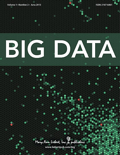
Big Data
Scope & Guideline
Transforming data into insights.
Introduction
Aims and Scopes
- Big Data Analytics and Machine Learning:
The journal emphasizes the utilization of machine learning techniques in processing and analyzing large datasets, aiming to enhance decision-making processes and predictive modeling. - Network Analysis and Complex Systems:
Research on the structure and dynamics of complex networks is a core focus, investigating how information propagates through social networks, financial systems, and other interconnected domains. - Applications in Healthcare and Medicine:
The journal covers innovative applications of big data in healthcare, including predictive modeling for disease outbreaks, patient data management, and enhancing medical imaging techniques. - Data Privacy and Security:
With the increasing use of big data, the journal addresses challenges related to data privacy, compliance, and the ethical implications of data sharing and utilization. - Interdisciplinary Approaches:
The journal promotes interdisciplinary research that merges insights from various fields such as economics, environmental science, and social sciences, demonstrating the versatility of big data applications. - Data Visualization and Interpretation:
Research on effective visualization techniques for big data is highlighted, focusing on how to make complex data comprehensible and actionable for stakeholders.
Trending and Emerging
- Artificial Intelligence and Deep Learning:
There is a growing trend towards the application of AI and deep learning techniques in big data analytics, particularly in areas like image and speech recognition, predictive modeling, and anomaly detection. - Big Data in Finance and Economics:
Recent studies increasingly explore the role of big data in financial markets, including risk assessment, market predictions, and the impact of economic events, showing a heightened interest in quantitative finance. - Health Informatics and Predictive Analytics:
Research focusing on leveraging big data for healthcare applications, such as disease prediction and personalized medicine, is on the rise, emphasizing the potential of data to transform healthcare outcomes. - Social Media and User Behavior Analysis:
Analyzing user behavior through social media data is emerging as a key area, with implications for marketing, public health, and social dynamics, reflecting the relevance of social data in various applications. - Sustainability and Environmental Monitoring:
The intersection of big data with environmental science is gaining traction, focusing on climate modeling, resource management, and sustainability efforts, indicating a commitment to addressing global challenges through data.
Declining or Waning
- Traditional Statistical Methods:
There has been a noticeable reduction in the application of traditional statistical methodologies in favor of more advanced machine learning and AI techniques, indicating a trend towards more computationally intensive approaches. - Generalized Data Mining Techniques:
Broad data mining techniques that do not leverage the unique aspects of big data, such as scalability and real-time processing, are becoming less prevalent as the focus shifts to specialized algorithms tailored for big data contexts. - Basic Data Management Practices:
Simple data management and storage solutions are waning as more sophisticated frameworks and cloud-based solutions become standard, reflecting a shift towards integrated and scalable data management strategies. - Non-specific Industry Applications:
There is a declining interest in generic applications of big data that lack specific focus or innovative approaches, as researchers increasingly seek to address specific challenges within defined fields. - Single-Discipline Focus:
Research that solely focuses on one discipline without integrating insights from other fields is less common, as interdisciplinary collaboration is increasingly valued in big data research.
Similar Journals

Information and Organization
Connecting Scholars and Practitioners in Information ScienceInformation and Organization is a leading academic journal published by ELSEVIER SCI LTD, specializing in the dynamic fields of Information Systems, Library and Information Sciences, Management Information Systems, and Organizational Behavior. With an impressive Impact Factor that reflects its esteemed reputation, this journal enjoys a Q1 ranking in multiple categories, highlighting its significance in both research and practical applications. Established in 1996, the journal has paved the way for innovative research, fostering a community of scholars and practitioners who are dedicated to exploring contemporary challenges and opportunities in information management and organizational practices. While primarily available through subscription, the journal's impact resonates globally, making it an essential resource for researchers, professionals, and students eager to advance their knowledge and contribute to the evolving discourse in these crucial areas. With its rigorous peer-review process and a focus on cutting-edge topics, Information and Organization is committed to disseminating high-quality research that informs practice and policy, ensuring its critical role in shaping the future of information and organizational studies.

JOURNAL OF INFORMATION SCIENCE AND ENGINEERING
Pioneering Research for Tomorrow's Technologies.JOURNAL OF INFORMATION SCIENCE AND ENGINEERING, published by the Institute of Information Science in Taiwan, is a pivotal platform for the dissemination of innovative research in the multidisciplinary fields of information science and engineering. Established in 1993, the journal primarily focuses on areas such as library and information sciences, human-computer interaction, hardware and architecture, as well as computational theory and software development. Despite holding a current Q4 ranking in several categories, the journal demonstrates significant potential for growth, particularly in computation and software systems, as evidenced by its Scopus rankings and percentiles. Researchers, professionals, and students will find this journal to be an invaluable resource to stay abreast of evolving theories and technologies in information science. The journal is accessible through traditional subscription models, fostering a broad academic outreach. It serves to enhance knowledge-sharing and collaboration within this dynamic and ever-evolving field.
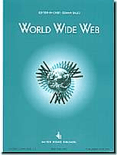
WORLD WIDE WEB-INTERNET AND WEB INFORMATION SYSTEMS
Exploring the Frontiers of Web TechnologiesWORLD WIDE WEB - INTERNET AND WEB INFORMATION SYSTEMS, published by Springer, is a leading academic journal that focuses on the cutting-edge areas of Internet technologies and web-based information systems. With an esteemed ISSN of 1386-145X and an E-ISSN of 1573-1413, this journal has been a significant contributor to the fields of Computer Networks and Communications, Hardware and Architecture, and Software since its inception in 1998. The journal consistently ranks in the Q1 category across these fields, reflecting its high impact and relevance, evidenced by its impressive Scopus rankings where it stands in the upper percentiles (79th for Computer Networks and Communications, 77th for Hardware and Architecture, and 75th for Software). Researchers, professionals, and students looking to stay at the forefront of web information systems will find a wealth of valuable resources and innovative research compellingly presented in this journal, available for publication until 2024.

International Journal of Data Science and Analytics
Transforming Ideas into Impactful Data SolutionsInternational Journal of Data Science and Analytics, published by SpringerNature, is a leading peer-reviewed journal dedicated to advancing the fields of data science and analytics. Since its inception in 2016, the journal has become an essential platform for researchers, professionals, and students, promoting the exchange of innovative ideas and cutting-edge research. With an impressive categorization in Q2 across multiple domains including Applied Mathematics, Computational Theory and Mathematics, and Information Systems, it demonstrates a notable impact within the academic community, as reflected by its high rankings in various Scopus categories. The journal emphasizes rigorous methodologies and practical applications of data science, making it a valuable resource for those seeking to enhance their understanding and application of data-driven solutions. Although it currently does not operate as an open-access journal, it is committed to disseminating high-quality research that shapes the future of analytics and computation. The journal's headquarters in Switzerland further enriches its international scope, fostering a global dialogue among scholars and practitioners alike.

Journal of Big Data
Connecting Ideas to Impact in Big Data ScienceJournal of Big Data, published by SPRINGERNATURE, is a leading academic journal dedicated to advancing the understanding and application of big data technologies and methodologies across various domains. Since its inception in 2014, this Open Access journal has gained recognition for its rigorous peer-reviewed research, boasting impressive rankings in multiple categories in Scopus, including Q1 in Computer Networks and Communications and Q1 in Information Systems. With its impactful contributions, the journal is positioned at the forefront of scholarly work on big data, addressing critical topics such as data analytics, storage, visualization, and applied data science. Its global reach and commitment to disseminating knowledge ensure that researchers, professionals, and students have equitable access to groundbreaking findings that empower advancements in technology and information systems. The Journal of Big Data continues to foster collaboration and inspire new research avenues leading to tangible impacts in the field.
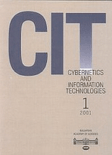
Cybernetics and Information Technologies
Exploring the Future of Computational TechnologiesCybernetics and Information Technologies is a pivotal academic journal, published by the Institute of Information and Communication Technologies at the Bulgarian Academy of Sciences. With its Open Access policy established since 2012, this journal facilitates wide dissemination of cutting-edge research across the field of computer science, particularly in the intersections of cybernetics and information technology. Indexed in Scopus, it holds a commendable position within the Q3 quartile for 2023, ranking #103 of 232 in the category of General Computer Science, placing it within the 55th percentile and attesting to its growing influence among peer publications. The journal not only aims to publish high-quality research but also seeks to foster a collaborative platform for academicians, practitioners, and students to advance the domain of computational technologies. With a focus on innovative methodologies and applications, Cybernetics and Information Technologies remains committed to addressing current challenges and exploring the future landscape of technology and information systems.

International Journal of Innovative Computing Information and Control
Advancing the frontiers of computational innovation.International Journal of Innovative Computing Information and Control, published by ICIC INT, is a prominent platform dedicated to advancing the fields of computational theory, information systems, software engineering, and theoretical computer science. Since its inception in 2007, the journal has garnered attention for its rigorous peer-reviewed research and has established itself within the academic community, attaining a notable Q3 quartile ranking across its categories as of 2023. With an impressive track record of convergence from 2007 to 2024, this journal offers a wealth of insights and innovations for researchers and professionals striving to push the boundaries of technology and computing. While it operates under a subscription model, the journal's commitment to enhancing knowledge in the ever-evolving landscape of computational sciences makes it an essential resource for academics, providing timely articles that address contemporary challenges in the field.

KNOWLEDGE AND INFORMATION SYSTEMS
Navigating the Evolving Landscape of Human-Computer InteractionKNOWLEDGE AND INFORMATION SYSTEMS, published by SPRINGER LONDON LTD, is a distinguished journal in the field of information systems, artificial intelligence, and human-computer interaction. With its ISSN 0219-1377 and E-ISSN 0219-3116, this journal has built a robust reputation since its inception, featuring a convergence of valuable research from 2005 through 2024. Catering to a diverse academic audience, it is classified among the leading journals in its category, proudly holding a Q1 ranking in Information Systems and Q2 rankings in multiple other domains. The journal aims to publish cutting-edge research that not only advances theoretical understanding but also provides practical applications within these rapidly evolving fields. Although it is not an Open Access journal, subscribers can access a wealth of knowledge critical for researchers, practitioners, and students looking to enhance their expertise. With a 2023 Scopus rank placing it within the 66th percentile for Information Systems, KNOWLEDGE AND INFORMATION SYSTEMS is an invaluable resource for those committed to pushing the frontiers of knowledge in technology and information science.
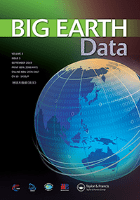
Big Earth Data
Shaping Tomorrow's Earth Science with Cutting-Edge Data AnalyticsBig Earth Data is a prestigious open-access journal that has been at the forefront of advancing research in the intersection of earth science and computer technology since its inception in 2017. Published by TAYLOR & FRANCIS LTD in the United Kingdom, this journal is dedicated to disseminating groundbreaking findings and innovative methodologies in the fields of Earth and Planetary Sciences and Computer Science Applications. With a commendable impact factor and an impressive positioning in the Scopus rankings—claiming Q1 status in Computers in Earth Sciences and Q2 in Computer Science Applications—it serves as a vital resource for researchers, professionals, and students alike. The journal encourages submissions that explore the integration of big data technologies in managing, analyzing, and visualizing earth-related data, thereby fostering interdisciplinary collaboration. Since embracing its open-access model, Big Earth Data has enhanced the accessibility of high-quality research, promoting a broader dialogue in the scientific community and contributing to informed decision-making in global environmental challenges.
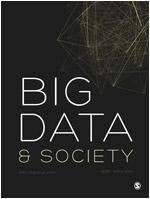
Big Data & Society
Illuminating the Path of Data Analytics in Contemporary IssuesBig Data & Society is a premier open-access journal published by SAGE Publications Inc, first established in 2014 in the United Kingdom. This influential journal has rapidly become a cornerstone in the landscape of big data research, with an impressive impact demonstrated by its Q1 ranking across various fields, including Communication, Computer Science Applications, Information Systems, and Library and Information Sciences. With its focus on the critical intersections between data analytics and societal implications, Big Data & Society serves as an essential platform for scholars, professionals, and students to disseminate cutting-edge research and foster discussion in these dynamic and impactful domains. Researchers benefit from its rigorous peer-review process and robust visibility, as evidenced by Scopus rankings placing it in the top percentiles across multiple categories. By upholding open-access principles, the journal ensures that scholarly work is readily available, facilitating broader engagement and knowledge transfer within the academic community and beyond.